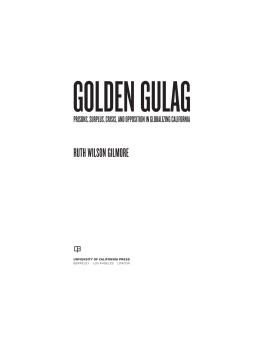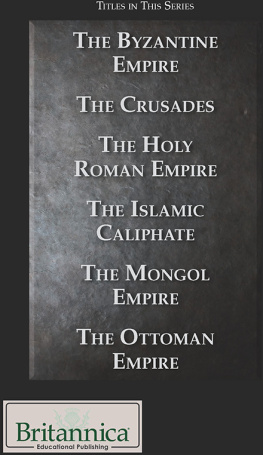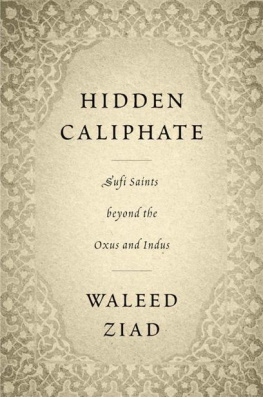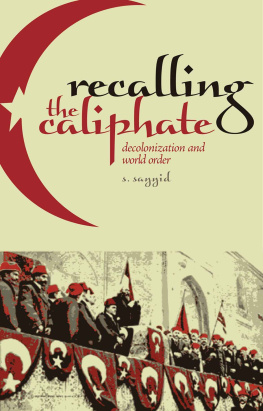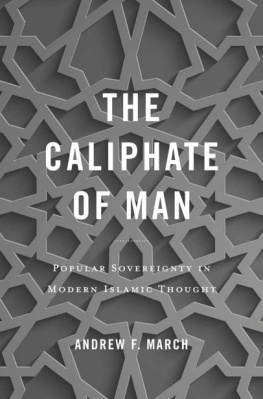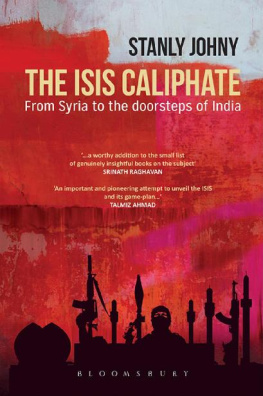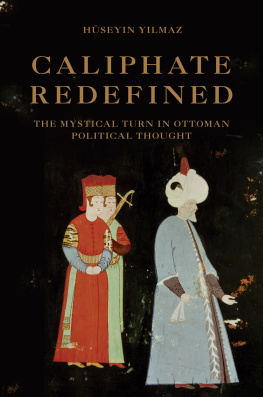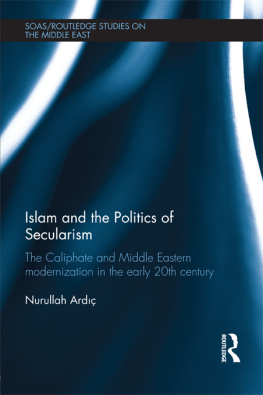
LONGING FOR THE LOST CALIPHATE
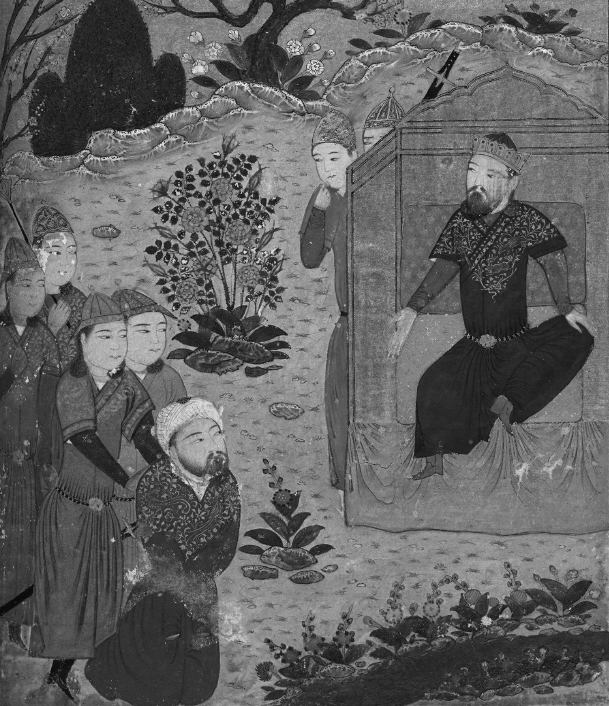
FRONTISPIECE. The last Abbasid caliph of Baghdad al-Mustaim (bottom left) brought on his knees as a captive before the Mongol commander Hleg (top right) sitting on a throne.
The British Library Board. Or. 2780, folio 89b.
LONGING
for the
LOST CALIPHATE
A TRANSREGIONAL HISTORY
MONA HASSAN
PRINCETON UNIVERSITY PRESS
PRINCETON AND OXFORD
Copyright 2016 by Princeton University Press
Published by Princeton University Press, 41 William Street, Princeton, New Jersey 08540
In the United Kingdom: Princeton University Press, 6 Oxford Street, Woodstock, Oxfordshire OX20 1TR
press.princeton.edu
Jacket image: The last Abbasid caliph of Baghdad al-Mustaim brought on his knees before the Mongol commander Hleg. Copyright The British Library Board, All Rights Reserved, Or. 2780, folio 89v.
All Rights Reserved
Library of Congress Cataloging-in-Publication Data
Names: Hassan, Mona, author.
Title: Longing for the lost caliphate : a transregional history / Mona Hassan.
Description: Princeton, N.J. : Princeton University Press, [2016] | Includes bibliographical references and index.
Identifiers: LCCN 2016016011 | ISBN 9780691166780 (hardcover : alk. paper)
Subjects: LCSH: CaliphateHistory. | Islam and state.
Classification: LCC BP166.9 .H37 2017 | DDC 297.6/1dc23
British Library Cataloging-in-Publication Data is available
This book has been composed in Adobe Text Pro and Poetica
Printed on acid-free paper.
Printed in the United States of America
10 9 8 7 6 5 4 3 2 1
For my mother with infinite gratitude and my children with deepest love
CONTENTS
ILLUSTRATIONS AND MAPS
ILLUSTRATIONS
MAPS
ACKNOWLEDGMENTS
WHOEVER DOES NOT thank people, does not thank God, is a statement attributed to the Prophet Muhammad in Sunan al-Tirmidh. And the debts of appreciation I have accumulated over the many years of researching and writing this book are boundless. To all those who helped in ways, large and small, thank you.
The germination of this book began deep in the library stacks of Princeton University, where I was working toward my doctoral degree. In those early days, the word caliphate had not yet become a topic of contemporary American discussion and geopolitics, although an older generation of Americans and Europeans may have fondly recalled the stories of One Thousand and One Nights set in Baghdad, the capital of the Abbasid Caliphate, as a land of fabled luxury and romantic mystique. As I worked on my research paper on Islamic law for Hossein Modarressi, though, I noted with surprise the distraught exclamations of Jall al-Dn al-Suy over the absence of a caliphate for three and a half years following the Mongol invasion of Baghdad in 1258, more than two hundred years before his time. Correlating that observation with a fortuitous Turkish assignment for Erika Gilson on the last Ottoman sultan-caliphs, I began to calculate the number of years since the Grand Nationalist Assembly abolished the Ottoman Caliphate in 1924 and wonder about its potential ramifications.
Michael Cook and kr Haniolu, my dissertation co-advisers, who firmly anchored me in early Islamic as well as late Ottoman and early Republican Turkish history respectively, warmly encouraged this project and supported it in many ways over the years. I am grateful for all of their help and guidance. Michael Adas at Rutgers University fostered my love of and training in global history from early on. His encouragement to see Islamic history as global history permeates this book and inspired me to follow his path of scholarly and teaching excellence.
I would also like to thank Stephen Reinert, Peter Golden, Al Howard, Jackson Lears, Matt Matsuda, and Carolyn Brown for their early training and support at Rutgers, as well as Gyan Prakash, Bob Tignor, Bernard Haykel, Kerry Walk, Ann Jurecic, and Patricia Armstrong for offering teaching opportunities at Princeton. I am also grateful to Muhammad Qasim Zaman for serving on my doctoral dissertation committee at Princeton with insight and intellectual generosity. I am additionally indebted to Nadia Moustafa of Cairo University and Ali Gomaa of al-Azhar University for supervising and facilitating my research and scholarly development in Egypt. In Turkey, Nejdet Gk of Necmettin Erbakan University, smail Kara of Marmara University, Azmi zcan of Sakarya University, and Recep entrk of Fatih Sultan Mehmet University offered invaluable assistance.
As an assistant professor of Religious Studies and History at Duke University, I greatly benefitted from the universitys support as well as an American Council of Learned Societies Fellowship and a Social Science Research Council Postdoctoral Fellowship for Transregional Research that together granted me a full year for further reflection, research, and writing.
Dukes Franklin Humanities Institute awarded me the opportunity to convene a book manuscript workshop in 201314, and I am deeply grateful for the insightful participation of Elizabeth Castelli from Barnard College of Columbia University and Jos Casanova from Georgetown University, my outstanding editor Fred Appel from Princeton University Press, and my participating colleagues in the Triangle who carefully read my lengthy draft manuscript Anna Bigelow, Bruce Hall, Jehangir Malegam, and Sumathi Ramaswamy.
I also greatly appreciate the suggestions and feedback on various portions of the manuscript that I received from Rodrigo Adem, Kalman Bland, JH Brown, Carl Ernst, Kathy Ewing, Tom Ferraro, Robert Gibbs, Shalom Goldman, Malachi Hacohen, Engseng Ho, Amaney Jamal, Ira Lapidus, John Martin, Sucheta Mazumdar, Adam Mestyan, David Morgan, Maha Nassar, Michael Provence, Ann Marie Rasmussen, Francis Robinson, S. Sayyid, Mariam Sheibani, Carol Symes, Mustafa Tuna, Brett Whalen, Tim Winter, Joe Winters, Erik Zitzser, and Erik Jan Zrcher. I did not always follow their and others sagacious advice, but I wholly value their discerning remarks, assistance, and provocations.
I am especially grateful to my colleagues in the Religious Studies Department, the History Department, and the International Comparative Studies Program for creating a vibrant community at Duke University as well as to my colleagues in the Triangle Medieval Studies Seminar, the Global Asia Working Group and Initiative, the Global History Seminar, and the Theory Reading Group. My colleagues in the Religion, Memory, History Group of the American Academy of Religion have always offered rich and thought-provoking discussions across our diverse areas of expertise.
Portions of this research were also presented at the meetings of the American Academy of Religion, the American Historical Association, and the Middle East Studies Association as well as in lectures and presentations at Duke University, Kings CollegeLondon, the Norwegian University of Science and Technology, Oxford University, Rutgers University, Stanford University, the University of North CarolinaChapel Hill, and Virginia Tech University.
I thank the librarians at Duke University, Princeton University, the University of Chicago, and the University of North CarolinaChapel Hill, especially Bill Blair, Stephen Ferguson, Christof Galli, Glenda Lacoste, Heidi Madden, Denise Soufi, Larisa Walsh, Cheryl Wilkins, and Erik Zitzser, for cheerfully feeding my insatiable appetite for books and helping with my queries often above and beyond the call of duty.
Next page

